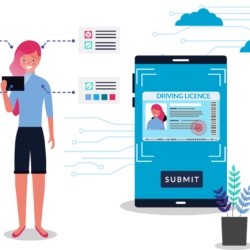Overcoming 7 challenges of Right to Work checks

If you employ people in the UK, you are probably aware of the legal requirement to check that all potential and existing employees, regardless of their nationality, are eligible to work through Right to Work checks. Most businesses have a process built into their recruitment policies, often a manual check involving a visual inspection and photocopy of identity document.
In this blog, we look at 7 challenges that Right to Work checks bring to a business and how technology can help overcome them.
With the growth of more diverse workforces and more flexible ways of working, the challenge of making accurate, consistent checks on staff is growing. At the same time, getting checks right is more important than ever as the Home Office continues to enforce Right to Work compliance and can impose potential fines of £20,000 per illegal employee. Illegal working can also harm a business’ reputation with customers and suppliers, damage their brand, increase the risk of fraud and impact their sponsorship licence.
Today, many businesses need to recruit staff across multiple locations and have to rely on managers in each location to make Right to Work checks using time-consuming and unreliable processes such manually checking and photocopying ID documents. With remote ID checking, you can introduce an electronic process into all of your locations, no matter how many or few employees are based there.

Often, in high-turnover businesses such as those in the retail and hospitality industry, getting new staff up and running quickly is critical and so recruitment teams need to make a quick decision on Right to Work status. If you’re making manual checks or sending document information to a central office, making a quick decision can be a huge challenge. A good Right to Work service should return a status within minutes, speeding up your on-boarding process whilst reinforcing your compliance standards.

With a manual Right to Work process, your recruitment teams need to know which documents are required to support an individual’s right to work status, (such as UK Visa, Biometric Residence Permit, Indefinite Leave to Remain). Current Home Office guidance, however, lists 17 different types of document, potentially issued in hundreds of different countries, that may need to be checked in a variety of combinations to demonstrate eligibility to work in the UK. Technology can help you to remove the need to train your staff as Right to Work experts by including guidance on the right documents to ask for.

Manually assessing identity documents is difficult and unreliable whilst training staff to spot fraudulent identity documents is time-consuming and expensive. Technology can help to validate an identity document’s visible and non-visible security features to help you identify anything suspicious.

If you’re asking different members of your team to take responsibility for Right to Work checks, how can you be sure that they are all checking documents in the same way? An electronic process walks your on-boarding teams through a consistent process, reduces the risk of unconscious bias and limits the chance of errors.

You need to be able to store proof of Right to Work checks, including identity documents and make these available for inspection by UK Border Agency or Home Office officials if required. With electronic validation technology, results are stored in an archive or available for download into your HR systems for easy access in the future.

If an employee has work-restrictions, such as a time-limited visa, you need to make sure that you have a clear process for making the necessary follow-up checks. Right to Work software can let you know when checks are due.

If you are facing any of these challenges, our Right to Work services could help. Please download our infographic to find out more.
Want to find out more?
Our Right to Work services are quick to set up, easy to use and affordable. Why not find out how they could help your business?
If you’re interested, you can read about our digital Right to Work process here.
Sign up to receive updates
Receive notifications from TrustID direct to your inbox. Simply fill out your email address in the form below.
Want to find out more?
We’d be really happy to chat through your requirements and offer advice on the best service for your business.
Tel: 0118 466 0822 or email us.
Request a callback


